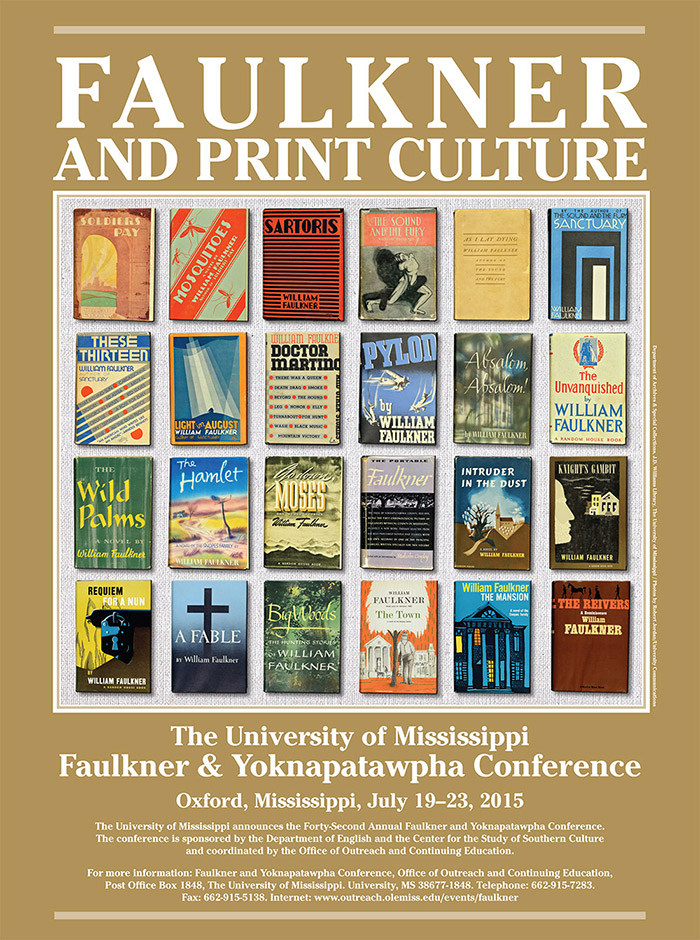
Panel. Faulkner and The Little Magazine
Location
Nutt Auditorium
Start Date
20-7-2015 3:30 PM
Description
- Einstein and an Alien: Faulkner's Tools for Building a Better Chicken House / Elizabeth Cornell, Fordham University
In what way did the lively and imaginative national conversation about Einstein and the theory of relativity that occurred in the press during the 1920s play an important, if subtle, role in Faulkner’s faceted approach to time in The Sound and the Fury>? This paper uses as context the forgotten short story about time travel, by Herman George Scheffauer, that appeared in the Double Dealer in 1921, to understand how Einstein’s ideas informed Faulkner’s consideration of the perception of time and its relationship to the experience of personal loss. - William Faulkner, Charles Henri Ford, and Blues: A Magazine of New Rhythms / Alexander Howard, University of New South Wales
Much is known about the relationship between William Faulkner and Ruth Ford. However, far less is known about Faulkner’s involvement with Ruth’s older brother, Charles Henri Ford. This paper considers the dealings between these two modernists. Of particular interest here is “Divorce in Naples.” Faulkner wanted Ford to publish his “Divorce” in the latter’s Blues: a Magazine of New Rhythms. Whilst Blues folded before the story could appear, this paper considers the possible rationale behind Faulkner’s alignment with this explicitly queer periodical, and the implications that Ford’s desire to carry the story had for both writers at pivotal moments in their careers. - Faulkner, Jean Toomer, and The Double Dealer: Evidence of an Artistic Encounter? / Anne MacMaster, Millsaps College
Exploring The Double Dealer’s connections with and differences from the other magazines that changed the course of literature and publishing in the U.S. in the 1920s, this paper examines The Double Dealer’s orientation on questions of race and American identity and considers how this print culture both shaped and was shaped by Faulkner and Jean Toomer. By comparing Faulkner’s experiences with The Double Dealer and its circle to those of Toomer, this paper identifies affinities between the two authors at a crucial point in their artistic development, especially when it comes to writing about intersections of race and sex in the America of the twenties.
Relational Format
Conference proceeding
Recommended Citation
Cornell, Elizabeth; Howard, Alexander; and MacMaster, Anne, "Panel. Faulkner and The Little Magazine" (2015). Faulkner and Yoknapatawpha Conference. 11.
https://egrove.olemiss.edu/fy/2015/schedule/11
COinS
Jul 20th, 3:30 PM
Panel. Faulkner and The Little Magazine
Nutt Auditorium
- Einstein and an Alien: Faulkner's Tools for Building a Better Chicken House / Elizabeth Cornell, Fordham University
In what way did the lively and imaginative national conversation about Einstein and the theory of relativity that occurred in the press during the 1920s play an important, if subtle, role in Faulkner’s faceted approach to time in The Sound and the Fury>? This paper uses as context the forgotten short story about time travel, by Herman George Scheffauer, that appeared in the Double Dealer in 1921, to understand how Einstein’s ideas informed Faulkner’s consideration of the perception of time and its relationship to the experience of personal loss. - William Faulkner, Charles Henri Ford, and Blues: A Magazine of New Rhythms / Alexander Howard, University of New South Wales
Much is known about the relationship between William Faulkner and Ruth Ford. However, far less is known about Faulkner’s involvement with Ruth’s older brother, Charles Henri Ford. This paper considers the dealings between these two modernists. Of particular interest here is “Divorce in Naples.” Faulkner wanted Ford to publish his “Divorce” in the latter’s Blues: a Magazine of New Rhythms. Whilst Blues folded before the story could appear, this paper considers the possible rationale behind Faulkner’s alignment with this explicitly queer periodical, and the implications that Ford’s desire to carry the story had for both writers at pivotal moments in their careers. - Faulkner, Jean Toomer, and The Double Dealer: Evidence of an Artistic Encounter? / Anne MacMaster, Millsaps College
Exploring The Double Dealer’s connections with and differences from the other magazines that changed the course of literature and publishing in the U.S. in the 1920s, this paper examines The Double Dealer’s orientation on questions of race and American identity and considers how this print culture both shaped and was shaped by Faulkner and Jean Toomer. By comparing Faulkner’s experiences with The Double Dealer and its circle to those of Toomer, this paper identifies affinities between the two authors at a crucial point in their artistic development, especially when it comes to writing about intersections of race and sex in the America of the twenties.

